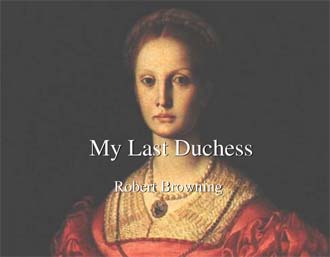勃朗宁<My Last Duchess>我的前公爵夫人-外国英语诗歌精选(英式英语)

「我的前公爵夫人」(My Last Duchess,1842)是Browning早期戏剧独白诗佳作之一。全诗只有56行,但内容几乎扺得上一部长篇小说。这首诗因为短小凝炼,对人物心理活动有敏锐的洞察力,是英国诗选和教材中必选之作。《我的前公爵夫人》是勃朗宁早期戏剧独白诗中最著名的一首。诗中的独白者是一个意大利文艺复兴时期的公爵。与勃朗宁所有其他独白诗一样,这首诗的独白也处于一个诗人不作明确交待,而让读者自己体察地特定的戏剧情境之中:公爵因前妻不做他的循规蹈矩的所有物,而把她除掉了;他预备再度结婚,对象是一位伯爵小姐;为了确定嫁妆的数量,伯爵派了一位使进来谈判;公爵领着这使者观看他的艺术收藏,中间有他的已故夫人画像。本诗就是公爵在他已故夫人的画像前对伯爵使者的一段“独白”。在独白中,公爵对画像表现了一个艺术鉴赏家和收藏家的夸耀和自豪,面对前公爵夫人其人却大加指责。勃朗宁正是通过公爵指责塑造了表面高尚雅量,实则冷酷残暴、等级观念和占有欲极强的公爵,以及热情开朗、平等待人的前公爵夫人形象。
My Last Duchess 我的前公爵夫人
Robert Browning
That's my last Duchess painted on the wall,
Looking as if she were alive. I call
That piece a wonder, now: Frà Pandolf's hands
Worked busily a day, and there she stands.
墙上的这幅面是我的前公爵夫人,
看起来就像她活着一样。如今,
我称它为奇迹:潘道夫师的手笔
经一日忙碌,从此她就在此站立。
Will 't please you sit and look at her? I said
'Frà Pandolf' by design, for never read
Strangers like you that pictured countenance,
The depth and passion of its earnest glance,
But to myself they turned (since none puts by
The curtain I have drawn for you, but I)
And seemed as they would ask me, if they durst,
How such a glance came there; so, not the first
你愿坐下看看她吗?我有意提起
潘道夫,因为外来的生客(例如你)
凡是见了画中描绘的面容、
那真挚的眼神的深邃和热情,
没有一个不转向我(因为除我外
再没有别人把画上的帘幕拉开),
似乎想问我可是又不大敢问;
是从哪儿来的——这样的眼神?
你并非第一个人回头这样问我。
Are you to turn and ask thus. Sir, 't was not
Her husband's presence only, called that spot
Of joy into the Duchess' cheek: perhaps
Frà Pandolf chanced to say, 'Her mantle laps
Over my lady's wrist too much,' or 'Paint
Must never hope to reproduce the faint
先生,不仅仅是她丈夫的在座
使公爵夫人面带欢容,可能
潘道夫偶然说过:“夫人的披风
盖住她的手腕太多,”或者说:
“隐约的红晕向颈部渐渐隐没,
这绝非任何颜料所能复制。”
Half-flush that dies along her throat:' such stuff
Was courtesy, she thought, and cause enough
For calling up that spot of joy. She had
A heart -- how shall I say? -- too soon made glad,
Too easily impressed; she liked whate'er
She looked on, and her looks went everywhere.
这种无聊话,却被她当成好意,
也足以唤起她的欢心。她那颗心——
怎么说好呢?——要取悦容易得很,
也太易感动。她看到什么都喜欢,
而她的目光又偏爱到处观看。
Sir, 't was all one! my favour at her breast,
The dropping of the daylight in the West,
The bough of cherries some officious fool
Broke in the orchard for her, the white mule
She rode with round the terrace -- all and each
Would draw from her alike the approving speech,
Or blush, at least. She thanked men, -- good! but thanked
先生,她对什么都一样!她胸口上
佩戴的我的赠品,或落日的余光;
过分殷勤的傻子在园中攀折
给她的一枝樱桃,或她骑着
绕行花圃的白骡——所有这一切
都会使她同样地赞羡不绝,
或至少泛起红晕。她感激人.好的!
Somehow -- I know not how -- as if she ranked
my gift of a nine-hundred-years-old name
With anybody's gift. Who'd stoop to blame
This sort of trifling? Even had you skill
In speech -- (which I have not) -- to make your will
Quite clear to such an one, and say, 'Just this
Or that in you disgusts me; here you miss,
Or there exceed the mark' -- and if she let
Herself be lessoned so, nor plainly set
Her wits to yours, forsooth, and made excuse,
-- E'en then would be some stooping; and I choose
Never to stoop. Oh, sir, she smiled, no doubt,
Whene'er I passed her; but who passed without
但她的感激(我说不上怎么搞的)
仿佛把我赐她的九百年的门第
与任何人的赠品并列。谁愿意
屈尊去谴责这种轻浮举止?即使
你有口才(我却没有)能把你的意志
给这样的人儿充分说明:“你这点
或那点令我讨厌。这儿你差得远,
而那儿你超越了界限。”即使她肯听
你这样训诫她而毫不争论,
毫不为自己辩解,——我也觉得
这会有失身份,所以我选择
绝不屈尊。哦,先生,她总是在微笑,
每逢我走过;但是谁人走过得不到
同样慷慨的微笑?发展至此,
我下了令:于是一切微笑都从此制止。
Much the same smile? This grew; I have commands;
Then all smiles stopped together. There she stands
As if alive. Will 't please you rise? We'll meet
The company below then. I repeat,
The Count your master's known munificence
Is ample warrant that no just pretence
Of mine for dowry will be disallowed;
Though his fair daughter's self, as I avowed
At starting, is my object. Nay, we'll go
Together down, sir. Notice Neptune, though,
Taming a sea-horse, thought a rarity,
Which Claus of Innsbruck cast in bronze for me!
她站在那儿,像活着一样。请你起身
客人们在楼下等。我再重复一声:
你的主人——伯爵先生闻名的大方
足以充分保证:我对嫁妆
提出任何合理要求都不会遭拒绝;
当然.如我开头声明的,他美貌的小姐
才是我追求的目标。别客气,让咱们
一同下楼吧。但请看这海神尼普顿
在驯服海马,这是件珍贵的收藏,
是克劳斯为我特制的青铜铸像。
Copyright (c) 1997-2000 by The Academy of American Poets
「我的前公爵夫人」(My Last Duchess,1842)是Browning早期戏剧独白诗佳作之一。全诗只有56行,但内容几乎扺得上一部长篇小说。这首诗因为短小凝炼,对人物心理活动有敏锐的洞察力,是英国诗选和教材中必选之作。《我的前公爵夫人》是勃朗宁早期戏剧独白诗中最著名的一首。诗中的独白者是一个意大利文艺复兴时期的公爵。与勃朗宁所有其他独白诗一样,这首诗的独白也处于一个诗人不作明确交待,而让读者自己体察地特定的戏剧情境之中:公爵因前妻不做他的循规蹈矩的所有物,而把她除掉了;他预备再度结婚,对象是一位伯爵小姐;为了确定嫁妆的数量,伯爵派了一位使进来谈判;公爵领着这使者观看他的艺术收藏,中间有他的已故夫人画像。本诗就是公爵在他已故夫人的画像前对伯爵使者的一段“独白”。在独白中,公爵对画像表现了一个艺术鉴赏家和收藏家的夸耀和自豪,面对前公爵夫人其人却大加指责。勃朗宁正是通过公爵指责塑造了表面高尚雅量,实则冷酷残暴、等级观念和占有欲极强的公爵,以及热情开朗、平等待人的前公爵夫人形象。
My Last Duchess 我的前公爵夫人
墙上的这幅面是我的前公爵夫人,
看起来就像她活着一样。如今,
我称它为奇迹:潘道夫师的手笔
经一日忙碌,从此她就在此站立。
你愿坐下看看她吗?我有意提起
潘道夫,因为外来的生客(例如你)
凡是见了画中描绘的面容、
那真挚的眼神的深邃和热情,
没有一个不转向我(因为除我外
再没有别人把画上的帘幕拉开),
似乎想问我可是又不大敢问;
是从哪儿来的——这样的眼神?
你并非第一个人回头这样问我。
先生,不仅仅是她丈夫的在座
使公爵夫人面带欢容,可能
潘道夫偶然说过:“夫人的披风
盖住她的手腕太多,”或者说:
“隐约的红晕向颈部渐渐隐没,
这绝非任何颜料所能复制。”
这种无聊话,却被她当成好意,
也足以唤起她的欢心。她那颗心——
怎么说好呢?——要取悦容易得很,
也太易感动。她看到什么都喜欢,
而她的目光又偏爱到处观看。
先生,她对什么都一样!她胸口上
佩戴的我的赠品,或落日的余光;
过分殷勤的傻子在园中攀折
给她的一枝樱桃,或她骑着
绕行花圃的白骡——所有这一切
都会使她同样地赞羡不绝,
或至少泛起红晕。她感激人.好的!
但她的感激(我说不上怎么搞的)
仿佛把我赐她的九百年的门第
与任何人的赠品并列。谁愿意
屈尊去谴责这种轻浮举止?即使
你有口才(我却没有)能把你的意志
给这样的人儿充分说明:“你这点
或那点令我讨厌。这儿你差得远,
而那儿你超越了界限。”即使她肯听
你这样训诫她而毫不争论,
毫不为自己辩解,——我也觉得
这会有失身份,所以我选择
绝不屈尊。哦,先生,她总是在微笑,
每逢我走过;但是谁人走过得不到
同样慷慨的微笑?发展至此,
我下了令:于是一切微笑都从此制止。
她站在那儿,像活着一样。请你起身
客人们在楼下等。我再重复一声:
你的主人——伯爵先生闻名的大方
足以充分保证:我对嫁妆
提出任何合理要求都不会遭拒绝;
当然.如我开头声明的,他美貌的小姐
才是我追求的目标。别客气,让咱们
一同下楼吧。但请看这海神尼普顿
在驯服海马,这是件珍贵的收藏,
是克劳斯为我特制的青铜铸像。

Robert Browning
That's my last Duchess painted on the wall,
Looking as if she were alive. I call
That piece a wonder, now: Frà Pandolf's hands
Worked busily a day, and there she stands.
Will 't please you sit and look at her? I said
'Frà Pandolf' by design, for never read
Strangers like you that pictured countenance,
The depth and passion of its earnest glance,
But to myself they turned (since none puts by
The curtain I have drawn for you, but I)
And seemed as they would ask me, if they durst,
How such a glance came there; so, not the first
Are you to turn and ask thus. Sir, 't was not
Her husband's presence only, called that spot
Of joy into the Duchess' cheek: perhaps
Frà Pandolf chanced to say, 'Her mantle laps
Over my lady's wrist too much,' or 'Paint
Must never hope to reproduce the faint
Half-flush that dies along her throat:' such stuff
Was courtesy, she thought, and cause enough
For calling up that spot of joy. She had
A heart -- how shall I say? -- too soon made glad,
Too easily impressed; she liked whate'er
She looked on, and her looks went everywhere.
Sir, 't was all one! my favour at her breast,
The dropping of the daylight in the West,
The bough of cherries some officious fool
Broke in the orchard for her, the white mule
She rode with round the terrace -- all and each
Would draw from her alike the approving speech,
Or blush, at least. She thanked men, -- good! but thanked
Somehow -- I know not how -- as if she ranked
my gift of a nine-hundred-years-old name
With anybody's gift. Who'd stoop to blame
This sort of trifling? Even had you skill
In speech -- (which I have not) -- to make your will
Quite clear to such an one, and say, 'Just this
Or that in you disgusts me; here you miss,
Or there exceed the mark' -- and if she let
Herself be lessoned so, nor plainly set
Her wits to yours, forsooth, and made excuse,
-- E'en then would be some stooping; and I choose
Never to stoop. Oh, sir, she smiled, no doubt,
Whene'er I passed her; but who passed without
Much the same smile? This grew; I have commands;
Then all smiles stopped together. There she stands
As if alive. Will 't please you rise? We'll meet
The company below then. I repeat,
The Count your master's known munificence
Is ample warrant that no just pretence
Of mine for dowry will be disallowed;
Though his fair daughter's self, as I avowed
At starting, is my object. Nay, we'll go
Together down, sir. Notice Neptune, though,
Taming a sea-horse, thought a rarity,
Which Claus of Innsbruck cast in bronze for me!
Copyright (c) 1997-2000 by The Academy of American Poets

